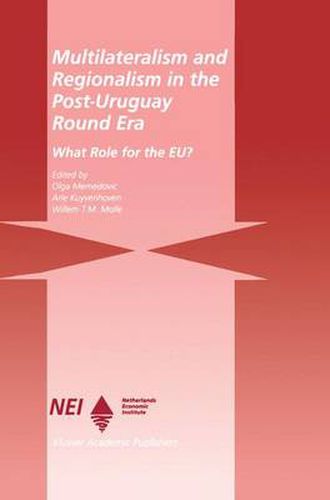Readings Newsletter
Become a Readings Member to make your shopping experience even easier.
Sign in or sign up for free!
You’re not far away from qualifying for FREE standard shipping within Australia
You’ve qualified for FREE standard shipping within Australia
The cart is loading…






This title is printed to order. This book may have been self-published. If so, we cannot guarantee the quality of the content. In the main most books will have gone through the editing process however some may not. We therefore suggest that you be aware of this before ordering this book. If in doubt check either the author or publisher’s details as we are unable to accept any returns unless they are faulty. Please contact us if you have any questions.
The Post-Uruguay Round era has seen a proliferation of regional preferential trade agreements (PTAs) as well as progressive multilateral trade liberalization initiatives. This has stimulated theoretical discussion on whether the policy of pursuing PTAs will have a malign or a benign impact on multilateralism. In the former case, proliferation of PT As may increase protection in global trade due to trade diversion effects, thereby creating impediments to multilateral freeing of global trade. In the latter case, the expansion of PTA membership could ultimately lead to non-discriminatory global free trade. At the core of this discussion is the question of how to explain the preference for PTA membership. While some economists view the expansion of PTA membership as exogenously determined, participants of the Fourth Annual Workshop of the Network EU-LDC Trade and Capital Relations also considered endogenous factors explaining increased PTA membership. This book offers a closer look at the motives of policy makers in both developed and developing countries to still adhere to PTAs, notwithstanding the theoretical superiority of multilateralism, and addresses the question of how to bring order into the world trading system. These issues are dealt with in 9 chapters by scholars from both the EU and LDCs. Each paper is discussed in terms of its policy relevance by a policy maker as well as by an academic specialized in the field.
$9.00 standard shipping within Australia
FREE standard shipping within Australia for orders over $100.00
Express & International shipping calculated at checkout
This title is printed to order. This book may have been self-published. If so, we cannot guarantee the quality of the content. In the main most books will have gone through the editing process however some may not. We therefore suggest that you be aware of this before ordering this book. If in doubt check either the author or publisher’s details as we are unable to accept any returns unless they are faulty. Please contact us if you have any questions.
The Post-Uruguay Round era has seen a proliferation of regional preferential trade agreements (PTAs) as well as progressive multilateral trade liberalization initiatives. This has stimulated theoretical discussion on whether the policy of pursuing PTAs will have a malign or a benign impact on multilateralism. In the former case, proliferation of PT As may increase protection in global trade due to trade diversion effects, thereby creating impediments to multilateral freeing of global trade. In the latter case, the expansion of PTA membership could ultimately lead to non-discriminatory global free trade. At the core of this discussion is the question of how to explain the preference for PTA membership. While some economists view the expansion of PTA membership as exogenously determined, participants of the Fourth Annual Workshop of the Network EU-LDC Trade and Capital Relations also considered endogenous factors explaining increased PTA membership. This book offers a closer look at the motives of policy makers in both developed and developing countries to still adhere to PTAs, notwithstanding the theoretical superiority of multilateralism, and addresses the question of how to bring order into the world trading system. These issues are dealt with in 9 chapters by scholars from both the EU and LDCs. Each paper is discussed in terms of its policy relevance by a policy maker as well as by an academic specialized in the field.